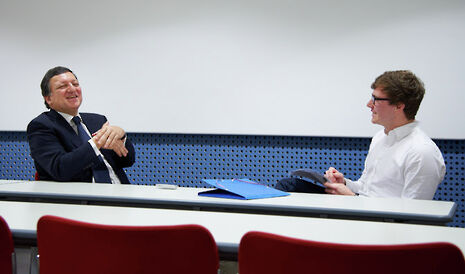“Europe needs Britain”
Rhys Treharne talks to the President of the European Commission, José Manuel Barroso, about the European Union’s mid-life crisis

The European Union has long since forgotten the celebration party it held for its fiftieth birthday in 2007. Instead, it now faces economic malaise, near monetary collapse, and constitutional fisticuffs, to such a degree that one wonders whether the EU is undergoing a mid-life crisis.
Not a bit of it, apparently. In fact, José Manuel Barroso, the current President of the European Commission, has some lifestyle advice for me and my impertinent opening remarks: "You know, there is an old saying: life begins at forty".
Very well; a flippant response to a flippant question. But President Barroso, the erudite and charming former Portuguese Prime Minister has a point, and he offers me a brief revision course in European history to prove it. "Where was Europe sixty years ago? We experienced probably the worst episode in the history of mankind, the Holocaust, that’s where we were. Thirty years ago? Much of Southern Europe was run by dictators". Today the community of twenty-seven member states has ensured the most obvious and most overlooked fact of contemporary European life: peace. "We have put together countries that were formerly enemies, we have created common institutions".
But President Barroso was not visiting Cambridge last week in the name of European harmony; rather, he was invited to deliver the annual Alcuin Lecture on the future challenges facing the EU. There was much in the speech to admire, but there was little in it that was new (though references to "the great work of Cambridge University in European student exchange schemes and joint research projects" certainly pleased the home crowd). There was, however, an interesting personal intimation: the President sometimes thinks of himself as "an accidental politician". His scholarly background does not suggest this (nor, I might add, do his garments: indeed, compared to most British politicians, Barroso is sartorially superior), but the job of President of the European Commission is an undeniably unusual one. Not accountable to an electorate, but representative of an entire continent, the office is itself a clumsy but necessary compromise, and President Barroso’s time at the top has been bumpy.
Yet in face of recent European crises – the narrowly avoided collapse of the Eurozone, the contentious Lisbon treaty, the perpetual problem of the ‘democratic deficit’ – the President remains boundlessly optimistic. "Of course Europe must recognise its problems", he admits, but this is no reason to dump the European project.
As a matter of fact, President Barroso’s brand of graceful Europeanism provides a refreshing contrast to the embattled Little-Englanders who dominate the European debate at home. I wondered what the President made of British attitudes to Europe: "Well, the people of Britain are very wise: they elect reasonable politicians at home, and the less reasonable ones they send abroad, usually to Brussels". He recognises Britain’s immense contribution to the EU: "Europe needs Britain; the Single Market, the fight against climate change – the UK has been a strong advocate of all these things". It has also been a strong advocate of Turkish entry into the EU, a fact that some French and German commentators regard as a threat to Europe’s ‘Christian personality’. The President is rightly horrified by such remarks: "Yes, there are countries opposed to the accession of Turkey, and of course the cultural heritage of Europe is Christian, but we have a great classical tradition in European society, as well influences from the Enlightenment and the Risorgimento. Europe is diverse and we ought not use religious arguments in a political context".
President Barroso’s cheerleading of the fundamental principles of the EU intrigued me. And what with the sound of collapsing scenery from the despotic Arab and Gulf states ringing in our ears, I asked the President if he regarded the EU as a model for the world. ‘One must always avoid arrogance in international relations, but if you mean a model as something we propose – not impose – then yes, I think the European experience has been successful. The EU has been a great laboratory for globalisation and ensuring peace. I can only say that I hope this experience inspires others’.
During our final few minutes together, I asked President Barroso about the state of European and British higher education: is this perhaps the route to further European integration? ‘Britain, partly thanks to its leading universities, is one of the most international places in the world. When young people on the continent think about their academic studies, they look naturally to this country. My advice to Britain is to keep it that way.'
 News / SU reluctantly registers controversial women’s soc18 December 2025
News / SU reluctantly registers controversial women’s soc18 December 2025 Features / Should I stay or should I go? Cambridge students and alumni reflect on how their memories stay with them15 December 2025
Features / Should I stay or should I go? Cambridge students and alumni reflect on how their memories stay with them15 December 2025 News / Dons warn PM about Vet School closure16 December 2025
News / Dons warn PM about Vet School closure16 December 2025 News / Cambridge study finds students learn better with notes than AI13 December 2025
News / Cambridge study finds students learn better with notes than AI13 December 2025 News / Uni registers controversial new women’s society28 November 2025
News / Uni registers controversial new women’s society28 November 2025









